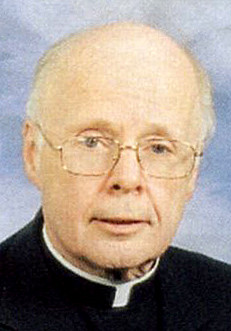
It would indeed be a narrow perspective if one were to say that the Synod of Bishops for the Transmission of the Gospel in the New Evangelization began on Oct. 11 and ended on Oct. 28.
Beginning more than a year and a half ago, the universal Catholic Church at the behest of Pope Benedict XVI has prayed over and reflected upon the mission of fulfilling Christ’s mandate to preach the Good News to the whole world. Questions on the topic were sent throughout the dioceses and the various bodies of the faith community. Many concerns were expressed, many hopes were raised and many suggestions made. These responses showed a great desire for recognizing the gifts the Church possesses and the opportunities that are now present for a deepening of the Church’s relationship with Christ. As a result, a working paper was issued that took into consideration the correspondents’ responses. This working paper served as a source of meditation for those who would participate in the three weeks of deliberations. Chosen by the Holy Father and their fellow bishops, the Synodal Fathers were joined by experts and leaders of ecclesial movements who were clergy, religious and laity. Each participant was able to present their unique perspective in their addresses at the gathering. (To prepare his own intervention, Cardinal Dolan took time to consult with the Archdiocesan Pastoral Council, the Priests’ Council, the Major Religious Superiors of communities who serve New York and the staff of the archdiocesan offices.)
Having met in formal situations as well as smaller sessions based on language, the Bishops issued a letter to members of the Church at the end of the Synod. It was an encouraging statement “to address…all in order to sustain and direct the preaching and teaching of the Gospel in the diverse contexts in which the Church finds herself today to give witness.” They instruct us to form “welcoming communities which “offer oases in the deserts of life.” Each and every baptized person is responsible to witness to Christ so that “the Gospel can enter the lives of all.”
But, they advise, before we can go forth and evangelize others we must be open to be strengthened by the presence of the Spirit within us. The Bishops remind us that when we are one with the Lord there is serenity, which gives us the courage to embrace the challenges of a world that is too often pessimistic, distracted by contradiction and wounded by sin. We have faced hard times before but we recognize that the truth will win out.
In their letter the Bishops demonstrate that through history the family has been a center of evangelization and, therefore, the fact that modern culture does not actively support strong models of marital commitment hampers the transmission of the faith. They go on to reflect that the ecclesial family must take advantage of the charisms of each vocation for fulfilling the mission of witnessing to the joy of knowing Christ. Those ordained must be formed well for their work with the laity who are dedicated to serving, in many capacities, the ecclesial community. “Spes ecclesiae,” the hope of the Church, has been a long-held mantra in terms of the youth of the community. They must be formed to utilize their creative enthusiasm to do the “Father’s work.”
Remembering the words and spirit of Vatican II embodied in its documents, in the synods that followed and in the Catechism of the Catholic Church, the Bishops rejoice in the ministry of contemplatives, encourage the preferential option for the poor and support the unity of the particular churches especially those experiencing suffering and persecution. No matter where we live and worship, the Bishops emphasize the universal call to holiness.
As they voted on the propositions to be presented to a commission of Synodal Fathers and, ultimately, to the Holy Father for consideration as he writes his apostolic exhortation, the Bishops placed their efforts under the patronage of Mary as the Star of the New Evangelization. These propositions were very concrete. They remind us that the Holy Trinity is the source of the New Evangelization. They call for the use of the positive elements of cultures around the world in the proclamation of the Gospel. They insist that the New Evangelization is a permanent missionary dimension of the Church. They recognize that in many cases the New Evangelization will be faced with challenges from a highly secularized society. The believer, to be strengthened in his own faith, should prayerfully read the Scripture, renew his knowledge of the documents of Vatican II and participate in the sacramental life of the Church, especially in the ministry of reconciliation. Acting in a spirit of true human freedom, the Church must use all means of communication to share the truth, beauty and goodness of faith.
To fulfill this reality, all evangelizers, that is all believers, need to be formed with programs that strengthen family life, guide the efforts of catechists and encourage collaboration among elements of the clergy, religious and laity.
The Synod’s work now moves back to the particular churches, such as the Archdiocese of New York. Recognizing that the family is the “first church,” there should be great encouragement to pray the Rosary and see it as a unique catechetical tool for each family member to encounter Christ; attend to the Sacrament of Penance on a regular basis as a family; and perform acts of charity as one. Parishes establish themselves as life-long formation centers touching young and old alike with spirited witnessing; conduct parish missions; and outreach to the larger community being Christ especially to the most vulnerable.
As the Bishops stated the New Evangelization is the mission that will endure until the Lord returns. When He does, may He find faith because His people believed, loved and gave witness to hope.
Father Brian McWeeney, director of adult faith formation, is coordinator of the Year of Faith in the archdiocese.